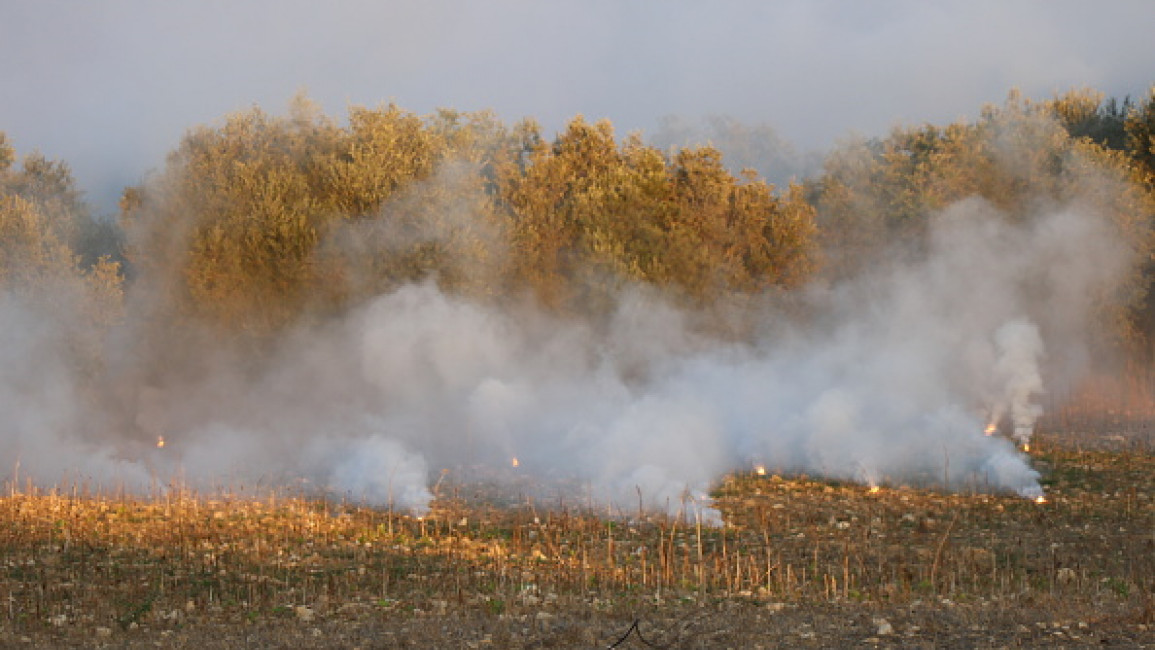Lebanese agriculture disrupted as border clashes with Israel intensify
The production and transport of Lebanese agricultural products have been disrupted by the intensifying clashes between Israel and pro-Iran group Hezbollah and various Palestinian armed factions in border regions, leading to fears of the impact on the agricultural sector and food sovereignty, farmers and officials told The New Arab.
Farmers along the Lebanese border said that fighting has displaced workers who normally harvest olives, as well as prevented farmers from taking their tobacco to market and preparing next year's crops.
The eleven days of back-and-forth rocket exchanges between Hezbollah and Israel have come during the peak of olive and tobacco harvest season.
"We have had to leave all of our crops behind, 95 per cent of the workers have fled, and movement is very difficult. Every day is a loss, and if this continues, the whole season will be a loss," Francis Abu Rahal Hanaker, a farmer in the border town of Wazzani, told TNA.
Hanaker said that he had invested about $500 per dunam for his 2000 dunam farm this season and that if he is unable to harvest his current crop and plant for the next season, he will incur about a US$1 million loss.
"There are more than 12,000 families which are partially dependent on tobacco farming in the region. It's now time to deliver it to the state [tobacco agency], but this process is now partially paralyzed," Mohammed al-Husseini, the head of the southern Lebanon farmers syndicate, told TNA.
The fighting between Hezbollah and Israel has so far been limited to rocket exchanges within a few kilometres of the border, but escalating rhetoric has created a fear of a larger between the two parties.
The uncertainty has hamstrung farmers' ability to plan for the next season, portending large financial losses even for those farmers who already harvested their summer crops.
"The annual cost of our farm is around US$600,000; we produce 1,300 tons of table grapes from the farm [in Wazzani]. If we can't prepare for the next season, it will really damage us," Samer Hayeck, the production and operation manager for the Lebanese company Medigardens, told TNA.
Hayeck said that border clashes have also prevented them from purchasing products grown in the southern city of Naqoura, particularly avocados.
His company has also moved its farming equipment from the border regions to Lebanon's Bekaa valley for fear of further escalations in the country's south.
Risks to food sovereignty
While officials have said there are no immediate risks to food security in the country, farmers and officials have said that should the conflict be prolonged or escalate into a full-scale war, imports and exports could be in danger.
"Lebanon uses a big percentage of food from abroad, with a big percentage of wheat and meat imported. If the port closes, we couldn't export our production or import," an official from the Ministry of Agriculture, speaking anonymously as they are not allowed to talk to media, told TNA.
According to the UN, Lebanon relies on food and wheat to cover about 80 per cent of its needs.
The head of the Lebanese bread syndicate said on Friday that there was a two-month stock of flour in the country.
But some farmers, like Hayeck, have said that in the event of a war, logistical challenges and damage to infrastructure could endanger their ability to harvest and export their products.
"Fifty per cent of our crops are still on the trees, 500 tons are in cold storage. If the port is closed, we will be totally dead," Hayeck said.
He further drew on the example of the 2006 war between Israel and Lebanon, where Israel bombed large buildings in the Bekaa valley similar to his company's warehouses.
Consumer behaviour has also changed in anticipation of a potential war, with customers stocking up on non-perishable vegetables such as potatoes and onions.
"In the market, there is no purchasing power, and a change in consumer acceptance of products towards products you can store. As for farmers, they are stockpiling fuel," Ibrahim Tarchichi, the secretary of exporters and importers syndicate in Lebanon, told TNA.



